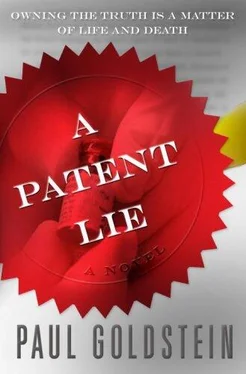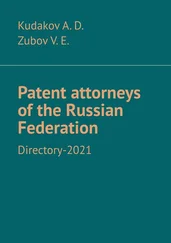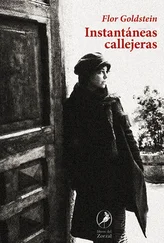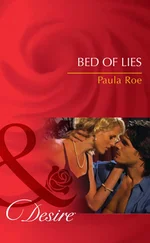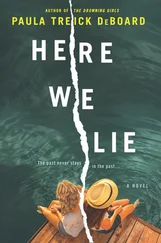Paul Goldstein - A Patent Lie
Здесь есть возможность читать онлайн «Paul Goldstein - A Patent Lie» весь текст электронной книги совершенно бесплатно (целиком полную версию без сокращений). В некоторых случаях можно слушать аудио, скачать через торрент в формате fb2 и присутствует краткое содержание. Жанр: Криминальный детектив, на английском языке. Описание произведения, (предисловие) а так же отзывы посетителей доступны на портале библиотеки ЛибКат.
- Название:A Patent Lie
- Автор:
- Жанр:
- Год:неизвестен
- ISBN:нет данных
- Рейтинг книги:3 / 5. Голосов: 1
-
Избранное:Добавить в избранное
- Отзывы:
-
Ваша оценка:
- 60
- 1
- 2
- 3
- 4
- 5
A Patent Lie: краткое содержание, описание и аннотация
Предлагаем к чтению аннотацию, описание, краткое содержание или предисловие (зависит от того, что написал сам автор книги «A Patent Lie»). Если вы не нашли необходимую информацию о книге — напишите в комментариях, мы постараемся отыскать её.
A Patent Lie — читать онлайн бесплатно полную книгу (весь текст) целиком
Ниже представлен текст книги, разбитый по страницам. Система сохранения места последней прочитанной страницы, позволяет с удобством читать онлайн бесплатно книгу «A Patent Lie», без необходимости каждый раз заново искать на чём Вы остановились. Поставьте закладку, и сможете в любой момент перейти на страницу, на которой закончили чтение.
Интервал:
Закладка:
Seeley had forgotten about the bruises. “Why didn't you tell me you were colluding with St. Gall?”
Leonard stepped back. Behind him, the glass wall reflected the office and open doorway so that they appeared to hang outside in the night. Thirty-two years, Seeley thought, and how far have we come from two boys waiting in a shared room for their drunken father to crash through the door.
Seeley said, “You made a deal with St. Gall.”
“Of course we did. This goes back to before you got into the case. Joel worked it out with the Swiss. It was a business adjustment. I didn't have anything to do with it.”
“But you knew about it.”
“Look, we've sunk almost half a billion dollars into AV/AS. St. Gall had a problem with one of their researchers being caught in our labs, and we had a problem with Steinhardt's notebooks. So Joel made a deal.”
Seeley wondered if Leonard and the others at Vaxtek knew Lily's secret. Their most famous researcher hadn't just fabricated a few dates in his notebooks; he had stolen another scientist's discovery and claimed it as his own.
“And because you knew how the case would come out, you went into hock buying Vaxtek shares. You knew about the collusion when you came to see me in Buffalo. You dragged me into it.”
“The way I see it,” Leonard said, his voice becoming a whisper, “I dragged your ass out of the swamp you were sinking into.” This was an old trick of Leonard's when they argued, lowering his voice to taunt him, forcing him to draw closer. “Would you have taken the case if I told you it was a sure thing?”
“I was your insurance policy,” Seeley said. “You thought you could control me.”
“Me?” Leonard's face went slack-jawed, incredulous. “When did Leonard Seeley ever control his brother? Did I once tell you that if you lost this case it would break me?”
No, Seeley remembered, he hadn't. And if he hadn't asked, Renata would not have told him, either.
“Come on, Mike, whoever's name is on it, AV/AS is going to save lives.”
“But only at a price that the people who need it most won't be able to pay.”
“I already told you,” Leonard's voice had returned to normal, “we're only going to charge fifteen dollars a dose in Africa.”
“But Vaxtek isn't going to sell AV/AS in Africa. St. Gall is. And according to Chaikovsky's numbers, they won't sell it for less than forty-five dollars.”
Twelve-year-old Lenny peered out from the supplicating face in front of him, and a dam burst inside Seeley. One hand grabbed for Leonard's neck, flesh and collar slipping in his fingers, and the other slammed into his brother's chest, propelling him back against the window. There was a boom and the glass shuddered, flashing back reflected shards of desk, chairs, doorway, and, at the center, a face-his own-that Seeley didn't recognize.
Perspiration or tears streaked Leonard's cheeks. “What did I do wrong?”
Seeley's nerves, muscle, bone throbbed with rage.
“Who hired the Asian boys? Was that Vaxtek's idea or St. Gall's?”
“I've been away all week. If I'd known, it never would have happened.”
But he knew now, and that meant Warshaw or Barnum was behind the attack.
Seeley jammed Leonard's head sideways against the glass so that one fear-struck eye observed him while the other stared thirty-eight stories down to where pedestrians waited at a bus stop. The fury inside Seeley was like alcohol. It felt to him that he was devouring one drink after another.
“You weren't away when Pearsall died. Who arranged that?”
Leonard's body went slack. He said, “You're kidding me, right?”
Leonard knew something that he didn't, and Seeley expected that in a moment he was going to feel like a fool.
Seeley said, “Pearsall discovered the collusion, he confronted Warshaw about it, and that got him killed.”
Leonard said, “Who do you think set up the deal between us and St. Gall? Pearsall didn't discover a collusive lawsuit. He orchestrated it. He and Thorpe did.”
“Pearsall would never do that.” Even as he said it, Seeley asked himself what in fact he knew about Pearsall other than that he was a successful trial lawyer who took bird pictures, read philosophy, and played poker with Thorpe. Still inches from his brother's choked-up face, Seeley said, “You're lying.”
“Why would I lie, Mike?”
“Because that's what you do, Len, you lie. That's who you are.”
“This time I'm not.”
A halo of condensation formed on the glass around Leonard's head. Above it was the reflection of three or four figures standing at the office doorway, looking in. Seeley let go of Leonard and turned.
“There's nothing here,” he said, dismissing the onlookers. “We all have work to do. Let's get back to it.”
Leonard, breathing evenly again-was it part of his brother's insanity that he recovered so quickly? — said, “What are you working on?”
“Tomorrow's closing argument.”
“I'm glad I got back in time,” he said. “I wouldn't miss it for anything.”
TWENTY-TWO
The courtroom on Friday morning was bedlam. The bench, where Judge Farnsworth should have been disposing of motions, was empty. In the back row of the gallery, Phil Driscoll, the protester, was gesturing wildly at one of the investment bank lawyers; the lawyer, arms folded across his chest, nodded parentally. Seeley could just barely make out Gail Odum's slender figure inside the crowd of lawyers around her. Leonard, who said that he wouldn't miss Seeley's closing argument for anything, wasn't there.
She did it, Seeley thought, cheering silently. Lily did it. Hope leapt inside him.
Barnum wasn't at counsel's table, and if Seeley was right about what had happened, the general counsel would not be there for the remainder of the trial. Seeley looked across the well of the courtroom. Dusollier was missing, too. This evidently was not a day for clients to be out and about. Palmieri's arms rested expansively over the back of the chair on either side of him. His hair looked as if someone had ruffled it. His voice was excited. “Have you seen it?”
Seeley lifted the newspaper from the table. Odum's byline was on the front page, beneath the fold. The picture next to the article looked like it came from Lily's college yearbook-a serious girl in a buttoned-up blouse and an out-of-date hairdo with a bow-shaped barrette at each side of her forehead. She was unsmiling, except for a certain brightness in her eyes. Even without reading the article, Seeley's admiration for the smart, vulnerable-looking girl in the photograph made him gasp.
The first three paragraphs condensed what Lily had told Seeley: her work on AV/AS at St. Gall; her nighttime visit to Steinhardt's lab; Steinhardt's appropriation of her discovery as his own. In the remaining four paragraphs, Odum pieced together her own speculations about the odd progress of the trial proceedings and their connection to Lily's story. Vaxtek and St. Gall hadn't returned her phone calls, and she nowhere directly charged them with collusion. However, there was a quote from an anonymous lawyer that Thorpe's defense was the weakest he had ever seen in a major federal case, and readers could draw from that whatever inference they wished.
Seeley read the article a second time. When he looked up, he was aware that the courtroom had turned silent. From the bench, Judge Farnsworth was beckoning to him and Thorpe to come forward.
The judge's calm expression was impenetrable and her voice, when she asked the court reporter if she was ready, was contained. Studying Seeley and Thorpe over her half-frames, she said, “I am not going to ask if you or your clients were responsible in any way for the article in this morning's Chronicle. I'm told it was also on the television news. But I am going to ask the U. S. attorney to look into whether there is any connection between your clients and Dr. Warren's decision, on the eve of closing argument, to give her story to the press.”
Читать дальшеИнтервал:
Закладка:
Похожие книги на «A Patent Lie»
Представляем Вашему вниманию похожие книги на «A Patent Lie» списком для выбора. Мы отобрали схожую по названию и смыслу литературу в надежде предоставить читателям больше вариантов отыскать новые, интересные, ещё непрочитанные произведения.
Обсуждение, отзывы о книге «A Patent Lie» и просто собственные мнения читателей. Оставьте ваши комментарии, напишите, что Вы думаете о произведении, его смысле или главных героях. Укажите что конкретно понравилось, а что нет, и почему Вы так считаете.
